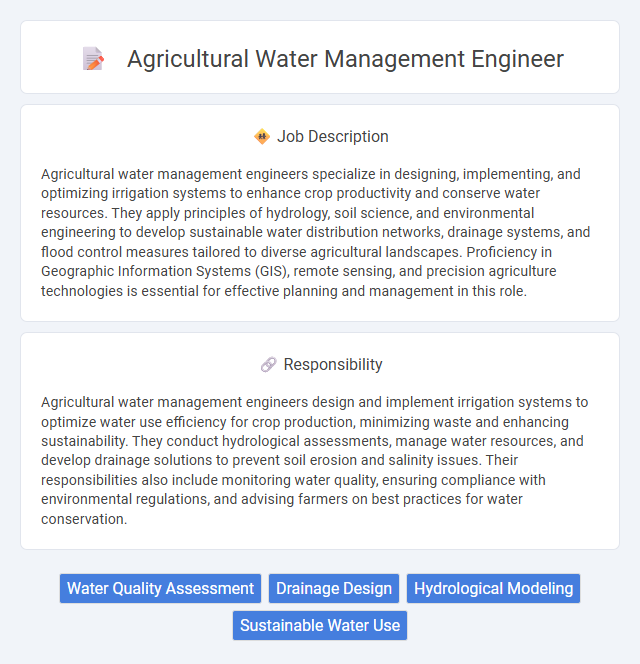
Agricultural water management engineers specialize in designing, implementing, and optimizing irrigation systems to enhance crop productivity and conserve water resources. They apply principles of hydrology, soil science, and environmental engineering to develop sustainable water distribution networks, drainage systems, and flood control measures tailored to diverse agricultural landscapes. Proficiency in Geographic Information Systems (GIS), remote sensing, and precision agriculture technologies is essential for effective planning and management in this role.
Individuals with a strong background in hydrology, environmental science, and agricultural practices are likely suitable for an Agricultural Water Management Engineer position. Those who are comfortable with fieldwork, data analysis, and sustainable resource planning may find this role aligns well with their skills and interests. People lacking technical expertise in irrigation systems or water resource management might face challenges adapting to the job's demands.
Qualification
An Agricultural Water Management Engineer requires a degree in agricultural engineering, civil engineering, or environmental engineering, combined with expertise in irrigation systems, water resource management, and soil-water-plant relationships. Proficiency in hydraulic modeling software, geographic information systems (GIS), and data analysis is essential to design efficient water distribution networks and optimize water use in agriculture. Strong knowledge of sustainable water practices, regulatory standards, and environmental impact assessments ensures effective management of agricultural water resources.
Responsibility
Agricultural water management engineers design and implement irrigation systems to optimize water use efficiency for crop production, minimizing waste and enhancing sustainability. They conduct hydrological assessments, manage water resources, and develop drainage solutions to prevent soil erosion and salinity issues. Their responsibilities also include monitoring water quality, ensuring compliance with environmental regulations, and advising farmers on best practices for water conservation.
Benefit
An agricultural water management engineer is likely to experience significant benefits such as enhancing irrigation efficiency, which can lead to reduced water waste and increased crop yield. There is a strong probability that their efforts will contribute to sustainable farming practices, improving soil health and supporting long-term agricultural productivity. This role may also offer opportunities for career growth and involvement in innovative water conservation technologies.
Challenge
Agricultural water management engineers likely face challenges related to optimizing irrigation systems under fluctuating climate conditions and limited water resources. They probably encounter difficulties in balancing efficient water use with crop yield demands while addressing environmental sustainability. Managing the integration of advanced technologies and regulatory compliance may also present significant obstacles in this field.
Career Advancement
Agricultural water management engineers specialize in designing efficient irrigation systems and sustainable water resource practices to maximize crop yield and conserve water. Career advancement opportunities include roles such as senior project manager, water resource consultant, and research scientist, with potential to influence policy and large-scale agricultural planning. Enhanced expertise in remote sensing, GIS technology, and climate adaptation strategies significantly boosts prospects for leadership positions and higher earning potential.
Key Terms
Water Quality Assessment
Agricultural water management engineers specializing in water quality assessment analyze and monitor irrigation water to ensure it meets safety and efficiency standards for crop production. They utilize advanced sampling techniques and chemical analysis to detect contaminants and nutrient levels, optimizing water use while preventing soil degradation and crop damage. Their expertise supports sustainable agriculture by maintaining water resources that promote healthy plant growth and environmental protection.
Drainage Design
Agricultural water management engineers specializing in drainage design develop efficient systems to control surface and subsurface water, enhancing soil health and crop productivity. They analyze soil types, topography, and water flow patterns to create sustainable drainage networks that prevent waterlogging and salinity buildup. Expertise in CAD software and hydrological modeling tools enables precise planning and implementation of drainage infrastructure tailored to varied agricultural landscapes.
Hydrological Modeling
Agricultural water management engineers specializing in hydrological modeling develop and apply computer simulations to predict water movement, distribution, and availability within agricultural landscapes. They analyze rainfall patterns, soil moisture, irrigation systems, and watershed dynamics to optimize water use efficiency and support sustainable crop production. Expertise in tools like SWAT (Soil and Water Assessment Tool) and HEC-HMS (Hydrologic Engineering Center's Hydrologic Modeling System) enables precise assessment of water resources critical for effective irrigation planning and flood risk management.
Sustainable Water Use
Agricultural water management engineers design and implement systems to optimize water use efficiency in farming, reducing waste and conserving vital resources. They employ advanced irrigation technologies, soil moisture monitoring, and data-driven scheduling to promote sustainable water use while enhancing crop yield and resilience. Their expertise supports environmental sustainability by minimizing water runoff, preventing soil erosion, and protecting local water bodies from contamination.
 kuljobs.com
kuljobs.com